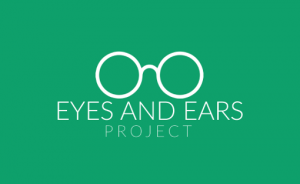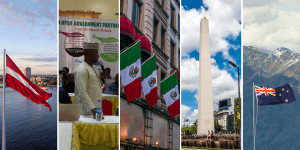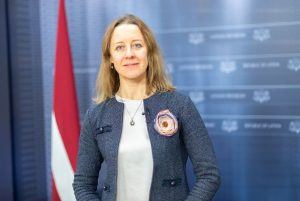Ensuring Better Transparency: How Latvia is Working to Protect Whistleblowers
Asegurando una mejor transparencia: El trabajo de Letonia hacia la protección de denunciantes
This blog is part of a series from students of the Institut de Sciences Politiques de Paris who interviewed reformers working on initiatives recognized by the OGP Leaders Network. Read the series here.
Within the backdrop of creating more open communities, the issue of enlisting regular citizens to speak up and denounce misconduct in the public and private sectors has progressively increased. In Latvia, the subject of whistleblower protection first came with the prosecution of Ilmārs Poikāns, who was convicted for leaking the salary increases of Latvian public company executives during a national economic recession and welfare cuts. The whistleblowing issue was twofold at the time: a lack of citizen awareness on the need to blow the whistle on corruption cases; and the lack of a specific legal framework protecting such actions. In October 2018, the Latvian Parliament adopted a law to strengthen the protection of whistleblowers and to consolidate reporting mechanisms in cases of misconduct. The new legislationCreating and passing legislation is one of the most effective ways of ensuring open government reforms have long-lasting effects on government practices. Technical specifications: Act of creating or r... encompasses the protection of anonymity and prevents retribution for filing those complaints.
A growing cultural change
Before the Whistleblower Protection Act’s adoption in Latvia, the role of whistleblowers in leaking wrongdoing or malfeasance in the workplace was not very well known. It was also clearly not recognized as a necessary action in the country’s customs.
To support the law’s implementation, Transparency International and Latvia’s State Chancellery are conducting innovative initiatives to better educate and communicate on the role of whistleblowers at large. In order to introduce real cultural change, grassroots actions have been critical in raising citizen awareness on the importance of whistleblowers for opening up societies. Transparency International Latvia (Delna) and the anticorruption movement Atkrāpies! organized an exhibition on whistleblowing at the National Library in Riga from September to October, 2017. It showcased nine international stories on how whistleblowing initiated positive changes. Moreover, an information campaign had been organized country-wide on whistleblower protection, and Latvia hosted an international conference on the issue.
Even though the first steps towards bringing whistleblowing to the debate appeared arduous, the way citizens see those acts has seen concrete improvements since the days of the Soviet Union.
A successful multi-layer partnership
The innovative initiative gathered a wide array of actors from civil society, businesses, Parliament and the public administration.
At the outset, passing the initiative proved to be difficult. According to Inese Kušķe of Latvia’s State Chancellery, a few segments of the Latvian society were reluctant at first, especially businesses and public administrations. Nonetheless, after an inclusive lawmaking process and a change of mindset from certain stakeholders (i.e. the corporate world), the initiative was adopted without any outcry. Such synergies acted as a first step towards instituting a real societal change. Indeed, if the law would have been debated today in 2021, it would have probably been even more smoothly adopted.
What challenges and stakes lie ahead?
For Transparency International, the main challenge is to increase reporting figures in the private sector. As Inese Taurina – head of Transparency International Latvia – points out, annual activity reports show that whistleblowing notifications are still mainly concentrated within the public spheres. For this reason, Delna is currently working on a handbook to provide guidelines on whistleblowing targeted at small and mid-size enterprises.
In addition, there is also the challenge of creating additional compensation and incentive mechanisms for blowing the whistle. Per their request, whistleblowers may today receive a small compensation for moral and non-material losses on the basis of court decisions, but more could certainly be achieved in this area. A financial incentive could have been integrated into the 2018 Act to provide courts with an added legal footing to grant compensations. On the model of Lithuania, Latvia could have also created a government reward for people blowing the whistle in the public interest. Such a reward would only amount to a few thousand euros, but would most likely contribute to a more systemic change towards how whistleblowing is treated in the long term.
Este blog es parte de una serie de estudiantes del Institut de Sciences Politiques de Paris que entrevistaron a reformadores que trabajan en iniciativas reconocidas por OGP Leaders Network. Lea la serie aquí.
En el contexto de la creación de comunidades más abiertas, la participación de la ciudadanía en alzar la voz y denunciar irregularidades en los sectores público y privado ha aumentado progresivamente. En Letonia, el tema de protección a denunciantes surgió por primera vez en el marco de la persecución de Ilmārs Poikāns, que fue condenado por filtrar información sobre el incremento salarial de ejecutivos de empresas letonias durante un tiempo en el que el país sufría una recesión económica a nivel nacional y recortes presupuestarios. En ese momento el tema de las denuncias tenía dos vertientes: la falta de sensibilización de la ciudadanía sobre la necesidad de denunciar casos de corrupción y la falta de un marco legal para proteger esas acciones. En octubre de 2018, el parlamento de Letonia adoptó una ley para fortalecer la protección a denunciantes y consolidar mecanismos de reporte en casos de irregularidades. La nueva ley abarca la anonimidad de las personas y protege contra represalias a quienes presenten denuncias.
Un cambio cultural cada vez mayor
Antes de la adopción de la ley de protección a denunciantes de Letonia, el papel de los denunciantes en filtrar irregularidades o delitos en los trabajos no era muy conocido. Y como parte de la cultura del país, la denuncia no era reconocida como una acción necesaria.
Para apoyar la implementación de la ley, Transparencia Internacional y la cancillería de Letonia están llevando a cabo iniciativas innovadoras para educar a la población y comunicar el papel de los denunciantes. Para generar un verdadero cambio cultural, las acciones a nivel comunitario han sido clave para la sensibilización de la gente alrededor de la importancia de las denuncias para generar sociedades abiertas. Transparencia Internacional Letonia (Delna) y el movimiento anticorrupción Atkrāpies! organizaron una exposición sobre denuncias en la libreríaa nacional de Riga entre septiembre y octubre de 2017. En la exposición se dieron a conocer nueve historias internacionales de denuncias que han impulsado cambios positivos. Además, se organizó una campaña de información en todo el país y una conferencia internacional con sede en Letonia sobre este tema.
Aunque los primeros pasos hacia incluir el tema de las denuncias en el debate fueron arduos, la forma en la que la ciudadanía hoy percibe estas acciones ha mejorado de forma concreta desde los tiempos de la Unión Soviética.
Una alianza exitosa
Esta innovador iniciativa reunió a una gran variedad de actores de la sociedad civil, empresas, el parlamento y la administración pública.
Al principio, la aprobación de la iniciativa fue difícil. De acuerdo con Inese Kušķe de la cancillería de Letonia, algunos segmentos de la sociedad, en particular empresas y administraciones públicas, se mostraron renuentes en el inicio. Sin embargo, después de llevar a cabo un proceso incluyente de diseño legislativo y un cambio de mentalidad de algunos actores (del mundo corporativo), la iniciativa fue adoptada sin protestas. Estas sinergias actuaron como un primer paso hacia la institución de un verdadero cambio social. Ciertamente, si la ley se hubiera discutido en el 2021, probablemente se habría adoptado aún más fácilmente.
¿Qué se espera en el futuro?
Para Transparencia Internacional, el reto más importante es incrementar las cifras reportadas en el sector privado. Como lo plantea Inese Taurina, directora de Transparencia Internacional Letonia, los informes anuales de actividades muestran que las notificaciones de denuncias siguen concentradas principalmente en las esferas públicas. Por ello, Delna está trabajando en producir un manual con pautas para presentar denuncias en pequeñas y medianas empresas.
Otro reto es la creación de mecanismos de compensación e incentivos por denunciar. Los denunciantes podrían recibir una pequeña compensación por las pérdidas morales y no materiales dependiendo de lo que decidan los tribunales, pero hay mucho por hacer en este tema. Un incentivo final pudo haberse integrado en la ley de 2018 para dar a los tribunales mayor poder de otorgar compensaciones. Tomando como referencia el modelo de Lituania, Letonia pudo haber creado una recompensa a las personas que denuncien casos de interés público. Aunque la compensación podría ser de solo unos cuantos miles de euros, lo más probable es que contribuiría a lograr un cambio sistémico hacia la cultura de la denuncia en el largo plazo.
No comments yet
Related Content
 Challenges and Solutions
Challenges and Solutions
Citizen Eyes and Ears on the Government: Kaduna State, Nigeria
Overspending and under-delivered infrastructure projects are among the symptoms of government vulnerability to corruption. Learn about Kaduna State "Eyes and Ears" project, which ensures that community funds are properly managed…

Five Government Innovations Recognized for their Work to Open up Government
Five open government reforms from Latvia, Mexico, New Zealand, the city of Buenos Aires, Argentina and the state of Kaduna, Nigeria have been recognized ...
 Champions
Champions
Faces of Open Government – Inese Kušķe
Protecting Whistleblowers in Latvia


Leave a Reply